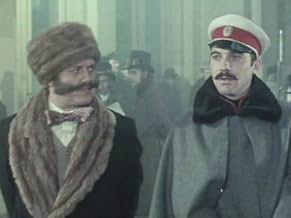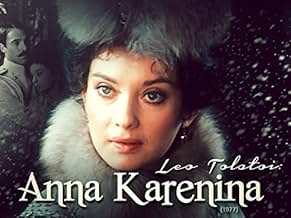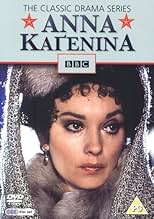Adicionar um enredo no seu idiomaAnna Karenina is the young wife of an older husband. She has an affair with the handsome Count Vronsky. By following her desires, Anna complicates her life.Anna Karenina is the young wife of an older husband. She has an affair with the handsome Count Vronsky. By following her desires, Anna complicates her life.Anna Karenina is the young wife of an older husband. She has an affair with the handsome Count Vronsky. By following her desires, Anna complicates her life.
- Indicado para 2 Primetime Emmys
- 5 indicações no total
Explorar episódios
Avaliações em destaque
I have to admit that I saw this series only once (in 1978), and my memory of it has faded somewhat. Nevertheless, I still vividly recall its vibrant reproduction of Tolstoy's masterpiece, its authentic characterizations, and its remarkable set pieces, especially given the fact that this was a television production.
Standouts include Nicola Pagett's complicated portrayal of Anna, and Robert Swann as the ambivalent Levin. The intoxicating scene of Levin and his peasants bringing in the harvest, and Anna's tragic demise are worth viewing again.
Hope the powers that be resurrect this one in the near future!
Standouts include Nicola Pagett's complicated portrayal of Anna, and Robert Swann as the ambivalent Levin. The intoxicating scene of Levin and his peasants bringing in the harvest, and Anna's tragic demise are worth viewing again.
Hope the powers that be resurrect this one in the near future!
After recently reading and falling in love with the book, I started doing research into the filmed adaptations of the novel. I first watched the BBC adaptation from 2000, which impressed me, but I was somewhat disappointed by the amount of editing done to the story.
I, therefore, picked up this version with great anticipation, because it is much longer (10 hours) and I was hoping would therefore be a more fully realized version of the story.
Unfortunately, I barely made it through the first hour before turning it off and giving up on it.
The whole production felt too staged and unnatural for my taste. The actors looked like English 'thespians' dressed up in stock period costumes rather than Russian aristocrats. And they all more or less spoke in the same loud and clear stage voice making the conversations feel less intimate than I would have liked.
Camera-work and directing was mostly just like that of a noontime soap opera.
I'm sure that in 1977 this was perfectly acceptable, but nowadays, it is just not good enough to spend time watching. It certainly does no justice to what is often considered one of the greatest novels ever written.
If you are looking for a filmed adaptation of this story, stick with the more recent version from 2000. While it is a somewhat edited down version of the story, it is a much superior product that does a far better job of fully capturing the richness of Tolstoy's novel.
I, therefore, picked up this version with great anticipation, because it is much longer (10 hours) and I was hoping would therefore be a more fully realized version of the story.
Unfortunately, I barely made it through the first hour before turning it off and giving up on it.
The whole production felt too staged and unnatural for my taste. The actors looked like English 'thespians' dressed up in stock period costumes rather than Russian aristocrats. And they all more or less spoke in the same loud and clear stage voice making the conversations feel less intimate than I would have liked.
Camera-work and directing was mostly just like that of a noontime soap opera.
I'm sure that in 1977 this was perfectly acceptable, but nowadays, it is just not good enough to spend time watching. It certainly does no justice to what is often considered one of the greatest novels ever written.
If you are looking for a filmed adaptation of this story, stick with the more recent version from 2000. While it is a somewhat edited down version of the story, it is a much superior product that does a far better job of fully capturing the richness of Tolstoy's novel.
While the best film versions are the 1967 Russian and 1935 Greta Garbo films, the best overall adaptation seen so far of Tolstoy's masterpiece Anna Karenina goes to this mini-series, the only adaptation personally seen so far that doesn't have any major debits.
Visually, it is a real beauty, with some breath taking scenery and sets, opulent costume design and elegant photography with lots of handsome colour. The period detail is not quite as evocative as it is in the 1967 and 1997 (with Sophie Marceau) films, but it is still remarkably authentic for a 70s made-for-TV mini-series. The music is appropriate and hauntingly beautiful, wisely keeping itself to the background in crucial scenes to let the dialogue really register, including a rare chance of hearing glimpses of Tchaikovsky's Manfred Symphony used for a mini-series. The mini-series also has a very thought-provoking, beautifully structured and literate script, that feels and sounds like Tolstoy's writing coming to life from the pages of the novel, covering all the major events and more and with the full emotional impact and more.
The story of Anna Karenina is very faithfully adapted here, one of the most faithful treatments of any adaptation of the novel in fact. In terms of detail, the major events, the subplots, the themes and the characters are all here, and not in Cliff Notes form, this is the real deal. The long length, with the 9 hour plus duration and 10 episodes, was more than appropriate and allowed richer characterisation, more of the story (this adaptation has the most well developed Levin by far for example) and all the material to be fully expanded upon (things that a 2-4 hour film couldn't do as effectively), as was the steady and very measured pacing to allow one to get fully immersed in the atmosphere and let the many nuances of the story and text come through. Anna Karenina (1977) is beautifully directed throughout, and the characters and their situations are always interesting.
Nicola Pagett is outstanding as a particularly passionately vulnerable Anna, which is played with pitch-perfect heartfelt pathos, and Stuart Wilson blows all the Vronskys in the film adaptations out of the water in a portrayal that is much more complex than any of the portrayals in any of the film versions, where half of the cinematic Vronskys make for problematic casting. The chemistry between the two of them is very believable with no sudden transitions and it doesn't feel rushed. Eric Porter's Karenin, a role played to a consistently high level in all the adaptations even in the weaker ones, is more conflicted than most, rather than being too sympathetic or too much of a reptile, more of a man caught in situations that more expose his weaknesses than his strengths, and he plays it magnificently. Robert Swann stands out in support as an ambivalent and multi-layered Levin, in a cast where everybody comes off strongly with few if any weak links.
All in all, a superb adaptation, adapted Tolstoy rarely gets much better than this. 10/10 Bethany Cox
Visually, it is a real beauty, with some breath taking scenery and sets, opulent costume design and elegant photography with lots of handsome colour. The period detail is not quite as evocative as it is in the 1967 and 1997 (with Sophie Marceau) films, but it is still remarkably authentic for a 70s made-for-TV mini-series. The music is appropriate and hauntingly beautiful, wisely keeping itself to the background in crucial scenes to let the dialogue really register, including a rare chance of hearing glimpses of Tchaikovsky's Manfred Symphony used for a mini-series. The mini-series also has a very thought-provoking, beautifully structured and literate script, that feels and sounds like Tolstoy's writing coming to life from the pages of the novel, covering all the major events and more and with the full emotional impact and more.
The story of Anna Karenina is very faithfully adapted here, one of the most faithful treatments of any adaptation of the novel in fact. In terms of detail, the major events, the subplots, the themes and the characters are all here, and not in Cliff Notes form, this is the real deal. The long length, with the 9 hour plus duration and 10 episodes, was more than appropriate and allowed richer characterisation, more of the story (this adaptation has the most well developed Levin by far for example) and all the material to be fully expanded upon (things that a 2-4 hour film couldn't do as effectively), as was the steady and very measured pacing to allow one to get fully immersed in the atmosphere and let the many nuances of the story and text come through. Anna Karenina (1977) is beautifully directed throughout, and the characters and their situations are always interesting.
Nicola Pagett is outstanding as a particularly passionately vulnerable Anna, which is played with pitch-perfect heartfelt pathos, and Stuart Wilson blows all the Vronskys in the film adaptations out of the water in a portrayal that is much more complex than any of the portrayals in any of the film versions, where half of the cinematic Vronskys make for problematic casting. The chemistry between the two of them is very believable with no sudden transitions and it doesn't feel rushed. Eric Porter's Karenin, a role played to a consistently high level in all the adaptations even in the weaker ones, is more conflicted than most, rather than being too sympathetic or too much of a reptile, more of a man caught in situations that more expose his weaknesses than his strengths, and he plays it magnificently. Robert Swann stands out in support as an ambivalent and multi-layered Levin, in a cast where everybody comes off strongly with few if any weak links.
All in all, a superb adaptation, adapted Tolstoy rarely gets much better than this. 10/10 Bethany Cox
I remember seeing this version of "Anna Karenina" on PBS when it was re- broadcast in the late 1980s. I actually taped the entire series on Beta video tape, but haven't checked at all recently to see if the tapes are still viable. I was deeply impressed with the production values of "Anna,' including the choice of filming locations, acting, costumes, and use of music. (I particularly remember the use of a lot of Tchaikovsky.)
I've always wondered why this magnificent production hasn't been re-issued on video or DVD. I for one would buy it in a heartbeat. Short of that, I should get my Betamax repaired and transfer the tapes to VHS, DVD, or VCD for my own use.
10/10
I've always wondered why this magnificent production hasn't been re-issued on video or DVD. I for one would buy it in a heartbeat. Short of that, I should get my Betamax repaired and transfer the tapes to VHS, DVD, or VCD for my own use.
10/10
Both of the leads, Nicola Paget and Stuart
Wilson, are nearly perfect in their roles. Wilson especially is a fully developed character and one a woman might fling away her life for. Nicola Paget is beautiful, high strung, and portrays Anna as a woman on the edge...more or less forced into an early marriage with a stuffy, pompous and very dull statesman. Only the love for her young son prevents her from divorcing at any cost. Meanwhile the love of her life Vronsky suffers for her as she drives herself to distraction. Wilson is really excellent as Vronsky and I also loved him as Fernando Lopez in The Pallisers. He is an underrated dramatic actor. The supporting characters are mostly well-cast and well-acted. I have watched many versions of this story and this version ranks at the top for me.
Você sabia?
- CuriosidadesAnna Karenina is a novel by the Russian author Lev Tolstoy, first published in book form in 1878. Considered to be one of the greatest works of literature ever written, Tolstoy himself called it his first true novel. It was initially released in serial installments from 1875 to 1877, all but the last part appearing in the periodical The Russian Messenger. When William Faulkner was asked to list what he thought were the three greatest novels, he replied: "Anna Karenina, Anna Karenina, and Anna Karenina."
- ConexõesFeatured in The 30th Annual Primetime Emmy Awards (1978)
Principais escolhas
Faça login para avaliar e ver a lista de recomendações personalizadas
- How many seasons does Anna Karenina have?Fornecido pela Alexa
Detalhes
- Data de lançamento
- País de origem
- Central de atendimento oficial
- Idioma
- Também conhecido como
- Ana Karenina
- Locações de filme
- Empresa de produção
- Consulte mais créditos da empresa na IMDbPro
Contribua para esta página
Sugerir uma alteração ou adicionar conteúdo ausente































